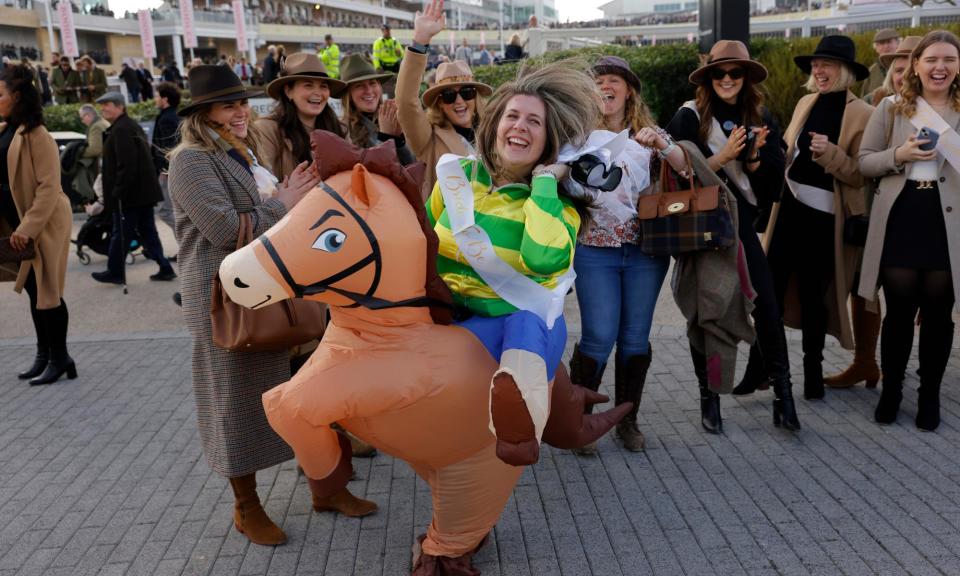Cheltenham must rethink Festival or face losing even more race fans

The smell of countryside, money and anticipation hung over the parade ring before the Gold Cup, almost certainly like it had when it was first run 100 years ago. A race with a roll of honour boasting champions such as Arkle, Golden Miller, Best Mate, Kauto Star and Desert Orchid marked its centenary with a more-than-worthy winner in Galopin Des Champs. Trained by the sport’s pre-eminent whisperer, Willie Mullins, the red-hot favourite made short work of pulling off back-to-back successes in steeplechasing’s toughest test.
Approaching the finishing line, Paul Townend’s only source of concern was a loose horse that had unshipped its rider and was now galloping freely upsides him, threatening to veer into the winning partnership’s way. With the first home well backed and the sun finally warming all present after days spent under thick clouds, the air around the racecourse was one of celebration following the blue riband event of a Festival, whose health is not quite as rude as the post-race scenes would have you believe.
Related: Cheltenham Festival 2024: Galopin Des Champs doubles up to win Gold Cup again – live
Boarding one of the large fleet of double-deckers that ferry punters from Cheltenham Spa station to the course four hours before the first horses came under starter’s orders, it was already apparent that Friday was going to be busier than the previous three days. Wednesday’s crowd was a worrying 21,729 below the Festival’s daily 68,500 capacity and with Tuesday and Thursday’s attendances also down on 2023, a year when surprisingly low crowds had already prompted concern, now is surely the time for the Jockey Club to acknowledge and do something about the large numbers of punters who have clearly decided attending what is an undeniably fun Festival has become far more aggravation than it is worth.
Anyone who has been will be aware of the expense and inconvenience that comes with simply getting to and from the course. They will also appreciate that the sheer quality of the equine combat used to make this expense and inconvenience worthwhile. For those whose budget doesn’t stretch to private helicopter hire, options are limited: constant kettling at a two-platform train station (and its adjacent shuttle bus pick-up and drop-off points) wholly unsuited to coping with Festival crowds, or else taking your chances in some woefully understaffed Hotel California of a car-park that can, in the event of a deluge, be extremely difficult to leave.
Far more knowledgeable racing folk have highlighted how small fields and a lack of competitiveness in races are putting off racegoers, with the dominance of a handful of trainers, Mullins foremost amongst them, backed by mega-rich owners doing little to increase the sport’s appeal.
When victory for a horse trained by Paul Nicholls and owned by a consortium including Sir Alex Ferguson is currently what’s passing as a victory for the little guy, something somewhere has clearly gone seriously awry. A keen student and lover of the game, the ITV racing pundit Kevin Blake has long been banging this particular drum while mooting very workable solutions. There will be owners and trainers who won’t like his ideas, but not so much that their disapproval would preclude them from sending horses to Cheltenham every year.
The race schedule aside, the Jockey Club needs to prioritise how best to trim the cost of a day at Prestbury Park in order to lure lapsed racegoers and newcomers back to a track where everything from tickets, to food, to drink and even racecards has to be paid for through the nose. Establishment bootlickers have pointed out admission to a day’s Festival racing is no more dear than getting into an FA Cup final or a day of Test cricket with an argument that smacks of whataboutism in the extreme.
The cost of going to Wembley or Lord’s is also ludicrously excessive, but at least such sporting theatres are in a city that offer a dizzying array of choice. The same cannot be said of a field a few miles outside a provincial town in Gloucestershire, where each March local hoteliers, Airbnb hosts, restaurateurs, publicans and shopkeepers welcome a captive audience and have no compunction in gouging them for every penny they can.
Lowering prices to make the Festival easier on the pocket seems an eminently more feasible option than attempting to lower the flag Mullins has planted on the summit of Cleeve Hill, the backdrop to what is now his own personal English fiefdom away from home. The master of Closutton is an immensely likeable, unassuming and approachable man whose relentless success is almost impossible to begrudge, despite the pleasure and tedium it simultaneously induces in lovers of his sport.
“Apart from the loose horse, there wasn’t much worry, was there?” he said after watching Galopin Des Champs hose up in his second Gold Cup. “You didn’t know which way he was going to go, and I could see Paul thinking he’d like to go on his inside in case he ran off the track.”
Mullins and his team will be back to dominate again next year but like the riderless horse that threatened one of his greatest triumphs, the popularity of the Cheltenham Festival among the public could also go either way.

